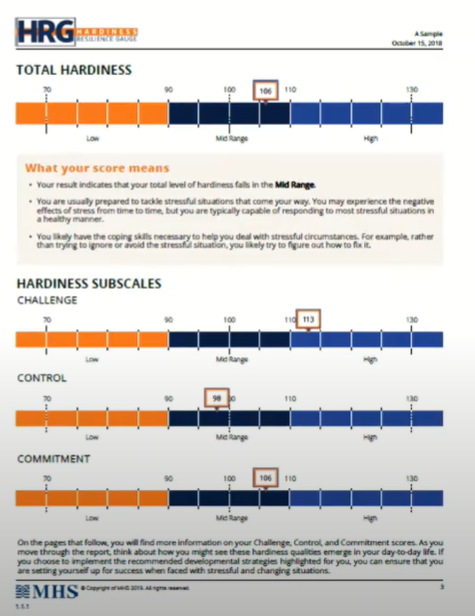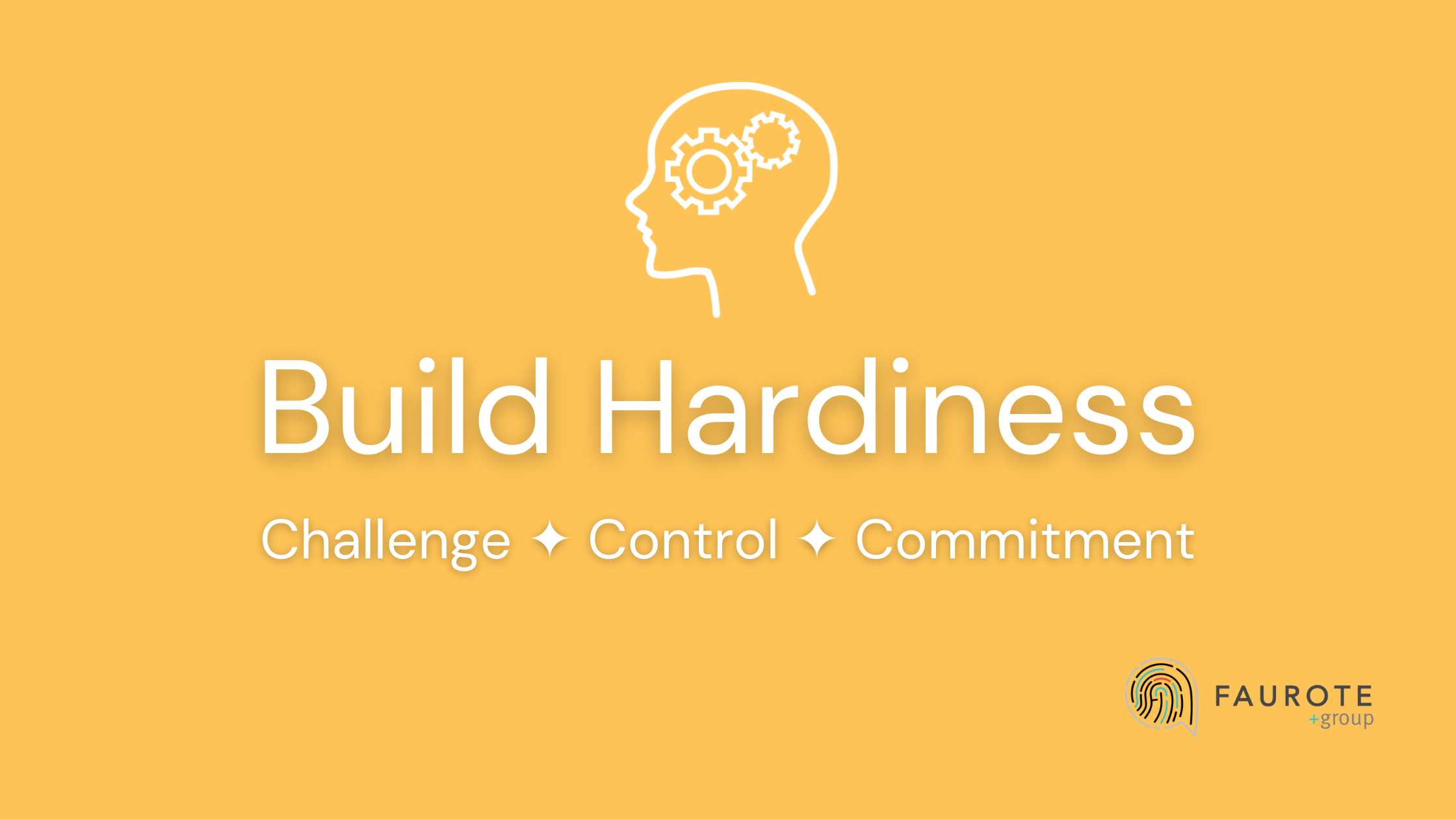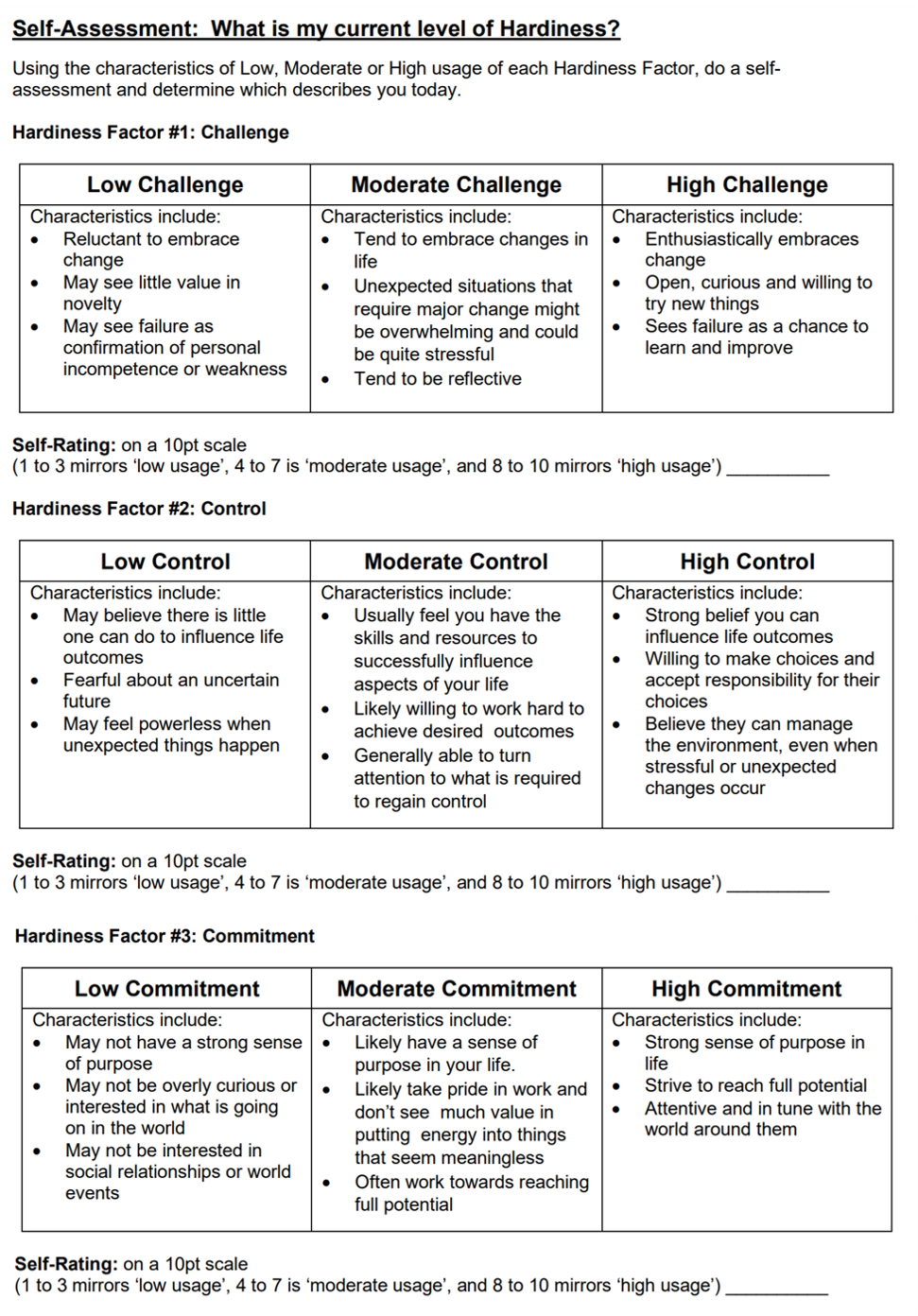How To Build Your Hardiness in 6 Minutes
As the stress continues, the risk of burnout rises. Burnout is officially a medical condition according to a USA Today article. If you’re wondering what “burnout” is — burnout is a state of emotional, physical and mental exhaustion caused by excessive prolonged stress. It often occurs when we feel overwhelmed, emotionally drained and unable to meet the constant demands going on around us. As that stress continues, burnout happens and we lose interest and motivation. Our energy is depleted and we experience exhaustion.
Are you or an employee experiencing burnout? Is there an increase in negativism or cynicism? Are you or a team member contributing less? What are the risks if you allow the burnout to continue unchecked?
Build Hardiness to Combat Burnout
You can use the concept of hardiness as a framework or tool to create resilience and combat the risk of burnout. Let’s first look at the definition of hardiness as a noun, It is “the ability to bear extreme conditions or difficult situations” (Cambridge Dictionary). We would say hardiness is being capable of enduring things like fatigue, hardship, or exposure to stress.
Hardy individuals have some unique things about them:
- They have fewer life work and interpersonal stressors.
- They have more adaptive coping skills, frequently displaying flexibility and adaptability.
- They are generally capable of more satisfaction in their lives, personal growth, more engagement and more happiness.
- They perform better when faced with stress.
- They are more effective leaders.
We know this from thirty years of research by Dr. Paul Bartone and Dr. Steven Stein.
Which of the above would you like to see more of in your organization? Or in yourself? I'm hoping you say ‘all the above’.
Hardy does not mean being impervious to stress or being someone who can eliminate it from their lives. It is so much more about somebody learning what to do with stress and treating it as a partner on the path to productive life outcomes. We often see stress as negative, but what we would like you to consider is the undeniable link between stress and success, which leads us to a tool that helps you build resilience.
The marvelous richness of human experience would lose something of rewarding joy if there were no limitations to overcome. The hilltop hour would not be half so wonderful if there were no dark valleys to traverse.
Helen Keller
Introducing the Hardiness Resilience GaugeTM
 The Hardiness Resilience Gauge (HRG) measures how effectively a person can cope with stress. The assessment provides a Total Hardiness score in addition to scores measuring three qualities that are instrumental for predicting how resilient an individual will be. These three qualities include:
The Hardiness Resilience Gauge (HRG) measures how effectively a person can cope with stress. The assessment provides a Total Hardiness score in addition to scores measuring three qualities that are instrumental for predicting how resilient an individual will be. These three qualities include:
- Challenge
- Control
- Commitment
It takes only a few minutes to complete, maybe eight to ten minutes, but it measures the concept of hardiness on those three dimensions. The tool gives you a baseline assessment of where your usage (or your employees’) is in these three areas of hardiness. It also gives you strategies for how to grow hardiness for you and your team and thus build resilience.
Challenge
Challenge is about seeing things that are changing or are novelty experiences in your life as exciting. Seeing them as opportunities for you to learn something new and to grow.
If you respond to the above statement with a “Oh yeah, I do. I get really excited by new things!” you probably trend high in the concept of challenge and can likely be more resilient to new things.
However, if you don't like those recent changes and novelty is something that you like to avoid, you will trend low in Challenge. You are likely someone who may have a harder time being resilient.
Control
The second C is Control. This is where we really have a sense of self efficacy or a belief that we can influence the outcomes in our life. Think about why this is so important to bouncing back. If you feel that no matter what you're given, you can do something that influences the outcome you are more likely to take action to bounce back during stressful times.
You will trend high in Control if this describes you. However, if you are someone who doesn't feel you have control or routinely has the mindset that you can't do anything about a situation, you’re likely to trend low in Control. It may be harder to bounce back during stressful times for you.
Commitment
The last C is Commitment. This measures your tendency to be engaged and see the things you're doing as interesting and meaningful. Commitment matters because you are more likely to be resilient and bounce back if you’re doing things that matter to you or that you enjoy.
Your Commitment level will trend high if you have a strong sense of purpose. If you don’t let obstacles stop you and you’re in tune with what you want and what you need.
You will trend low in Commitment if you don’t have a strong sense of purpose or have a low interest in what’s going on around you. You may not see new opportunities as intriguing enough to try.

The GOAL
The goal is to not only have a moderate to high usage of the three dimensions but have balance among all three which will increase your overall Bounce Back Factor. See below for a self-assessment.
Denny Faurote and Sarah Turner started the 6-Minute Stretch ChallengeTM to help you improve your Bounce Back Factors. They challenge you to take 6 minutes to grow your resiliency and hardiness and share the concepts with your team.
The Challenge at this point is to consider where you are in each of these three Cs?
Where do you trend on Challenge?
Where do you trend in Control?
Where do you trend in Commitment?

Download the resource sheet and watch the 6-Minute StretchTM video. Be sure to share this information with your team. Remember, they may experience burnout as well and this affects you, your entire team, and the company. Help them bounce back.
What’s Next?
Check out the videos below to create strategies to build each of the three Hardiness factors. Choose Challenge, Control, or Commitment to build your Bounce Back Factor.
Hardiness - Challenge
Hardiness - Control
Hardiness - Commitment
You can also sign up and get the 6-Minute StretchTM Challenges in your inbox every other Friday. Share these with your friends, your family, and your team. Help everyone leverage their flexible optimism. Because it's not just about helping ourselves, but helping others do the same. It's about bringing your best self to every situation. Life’s calling! Live with passion and make it a great day!